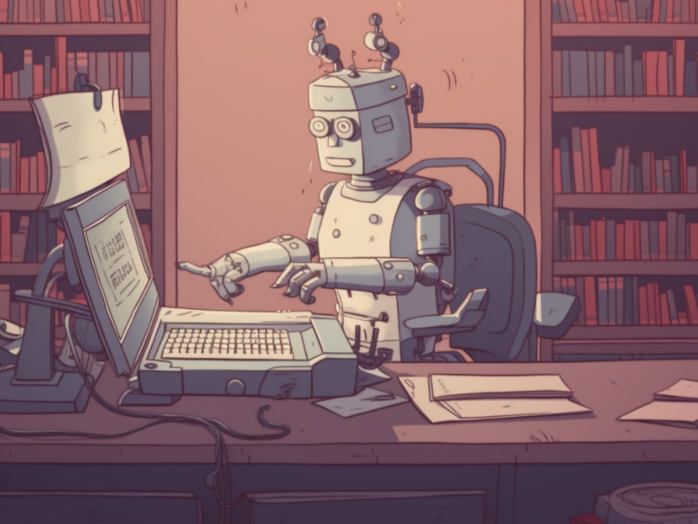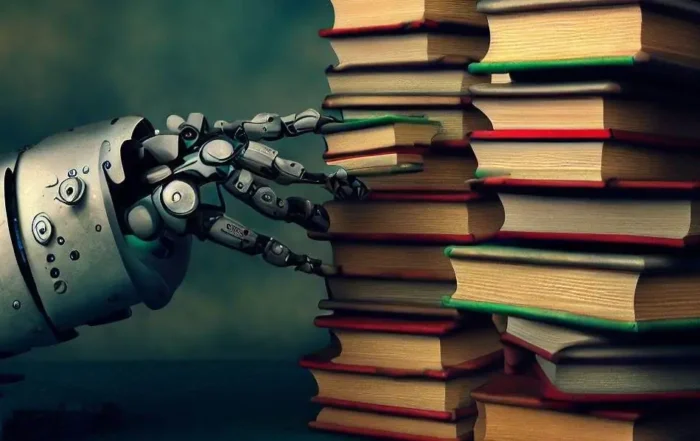
In the modern era of digital innovation, artificial intelligence (AI) is reshaping various facets of creative expression, including the art of crafting books. Writers can unlock new dimensions of creativity and efficiency, elevating their craft to unprecedented levels.
From streamlining research to enhancing narrative structures, AI is not just a tool for writers; it’s a collaborator in the creative journey, offering novel ways to approach the age-old art of storytelling.

Getting Started with AI for Writing
Embarking on the journey of integrating AI into your book creation process begins with understanding the tools at your disposal. Many software and applications are tailored to assist in the writing process, each with its unique features and capabilities. The first step is choosing the right tool that aligns with your creative needs and technical comfort level.
Once a suitable tool is selected, familiarizing yourself with its functionalities is crucial. This might involve tutorials, trial-and-error experimentation, or even attending workshops. The key is to start with basic features, and then gradually exploring more advanced options as you become more comfortable with the technology.
Incorporating AI into your existing workflow should be a gradual process. It’s about finding a balance where the technology supports and enhances your creative process without overwhelming it. This could mean using AI for specific tasks like research or idea generation initially, and then slowly expanding its role as you become more adept at using it.
AI book writing requires an open mind and a willingness to experiment with new methods of creativity. As you become more familiar with AI tools, you will discover how they can best serve your unique writing style and creative goals.
AI-Assisted Research and Idea Generation
Harnessing the power of advanced technology for research and idea generation marks a significant shift in how writers approach their craft. AI-driven tools can sift through extensive data, extract relevant information, and present it in a digestible format, saving considerable time and effort. This ability is particularly useful when exploring historical contexts, scientific concepts, or any topic requiring deep research.
Software’s capacity to generate creative ideas can be a game-changer. By inputting basic concepts or themes, writers can receive a plethora of suggestions on plot points, character arcs, or even entire story premises. These suggestions are often based on analyzing existing literature and trends, providing a fresh perspective that might have been overlooked.
It’s essential to approach these suggestions as raw material for creativity. They serve as starting points, which the writer must then develop, refine, and infuse with their unique voice and vision. AI’s role in this phase is to inspire and provide a broad canvas of possibilities, enabling writers to explore and craft stories that resonate with their creative ethos.

Enhancing Narrative Structure with AI
The structure of a narrative is fundamental to its success, and AI can play a pivotal role in enhancing this aspect of book writing. AI tools can analyze a story’s framework, offering insights into pacing, plot development, and narrative flow. This can be particularly beneficial for new writers or those tackling complex storylines, as it provides an objective view of the narrative structure.
AI can also suggest adjustments and improvements, such as identifying areas where the pacing might lag or where plot developments could be more impactful. These tools can offer alternative plot sequences or ways to connect story elements more cohesively, leading to a more engaging and well-structured book. As you know, this is a crucial factor in writing a high-quality book.
While AI can provide valuable input, the final decision on narrative structure should always rest with the author. It’s about using AI as a guide to enhance the storytelling process, not dictate it. The technology should serve to amplify the writer’s creative vision, ensuring that the narrative retains its authenticity and emotional depth.
Character Development and AI
Character development is a vital component of storytelling, and AI can significantly assist in this area. AI tools can generate detailed character profiles, including backstories, personality traits, and even potential character arcs. This feature can be particularly useful when a writer is stuck or looking for inspiration to deepen their characters.
It can analyze character dynamics, offering suggestions on how interactions and relationships can be developed or altered for greater narrative impact. It can propose scenarios or conflicts that might highlight certain character aspects, adding depth and complexity to the story.
It’s crucial to use these AI-generated ideas as a foundation upon which to build. The essence of character development lies in the writer’s ability to breathe life into these characters, making them resonate with readers on an emotional level. AI’s role should be to provide a starting point for exploration, with the writer bringing their unique insight and understanding to create truly compelling characters.

AI for Editing and Language Enhancement
Editing is a critical phase in book writing, where language is refined and polished. AI tools can significantly aid this process by providing comprehensive language analysis. These tools scan text for grammatical errors, stylistic inconsistencies, and clarity issues, offering corrections and suggestions for improvement. This level of detail can help writers enhance the readability and professionalism of their work.
AI’s capability extends to style and tone adjustments, where it can suggest changes to better align the writing with the intended audience or genre. For instance, it can recommend more simplistic language for a younger audience or a more formal tone for academic writing. This adaptability can be invaluable for writers looking to tailor their language to specific readers.
A Wrap-Up
Ai presents an opportunity to blend human creativity with technological innovation, leading to enriched storytelling and enhanced productivity. While it offers tools for research, idea generation, editing, and more, it’s crucial to remember that the heart of writing lies in the human experience and imagination.
AI should serve as a catalyst and aide, amplifying a writer’s innate creativity rather than replacing it. The fusion of AI with traditional writing practices promises a future rich with innovative storytelling and unprecedented creative expression.






